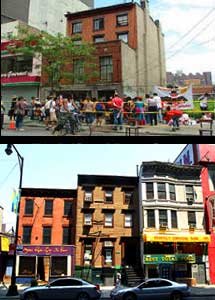 This was the determination of Justice Shirley Werner Kornreich of State Supreme Court regarding the use of eminent domain in West Harlem.
This was the determination of Justice Shirley Werner Kornreich of State Supreme Court regarding the use of eminent domain in West Harlem.The judge found that otherwise confidential documents should be available to certain critics of Columbia’s expansion plans because of the appearance of collusion between the state and Columbia.
The New York Times in "Neutrality in Expansion at Columbia Is Questioned" by (June 30, 2007 by Anemona Hartocollis) writes:
The main issue was the state’s hiring last year of a consultant, Allee King Rosen & Fleming Inc., or A.K.R.F., that was already working on the expansion project for Columbia, the judge noted.
In a ruling dated June 27 but released yesterday, Justice Kornreich ordered the state agency, the Empire State Development Corporation, to release 117 documents... to the West Harlem Business Group, a group of property owners who are resisting Columbia’s expansion.
A.K.R.F. is the state’s lead consultant on what is called a neighborhood condition study. The study is being done to determine whether the state would be justified in using its power of eminent domain to condemn property sought by Columbia for its expansion....
“The easiest way to put it is you can’t serve two masters, and that’s what’s going on here,” [Norman Siegel, a lawyer for some of the property owners] said. “The government has the power to condemn my clients’ property. But the process should be neutral and objective, and when you find out the government has retained Columbia’s consultant, it can’t be neutral anymore. It’s biased.”
Robert Hornsby, a spokesman for Columbia, said, “We weren’t involved at all with E.S.D.C.’s independent decision to hire outside consultants.”
Similar questions are being raised the the NYC Economic Development Corporation (EDC) plan to confiscate and demolish the private homes and businesses in Downtown Brooklyn. The EDC hired AKRF without a competitive bid, and AKRF returned a report that concluded that there was insufficient proof that the mid-19th century homes should be preserved bedause of connections with the Underground Railroad. AKRF reached this determination without using their staff archeologist and despite the calls for the preservation of the properties by the Peer Reviewers of their own document.
When questioned by the City Council on why they hired the EDC without looking at other companies, the EDC responded that AKRF has decades of experience writing similar reports. Justice Kornreich has shed some light on AKRF's related experience.
Unlike the city's Downtown Brooklyn rezoning, the Columbia expansion utilizes a state-wide authority, the ESDC. Apparently, AKRF's reputation is known far and wide.
